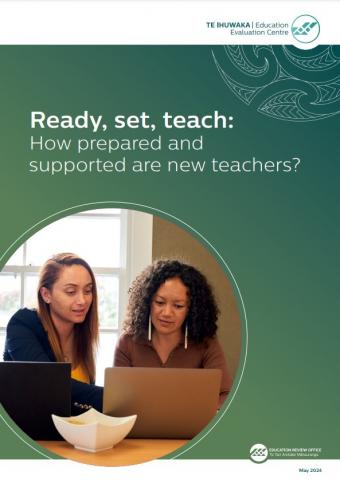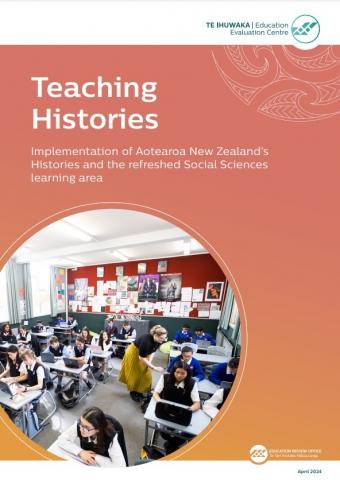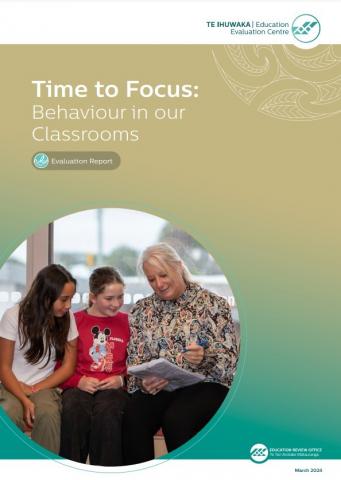
Tēnā Koutou Kātoa
Ngā mihi nui o te wā
Ko te Matariki pou rarama I te pō,
Ko Tumutumuwhenua pou whakairo i te awatea,
Kia māhuta o tātau tūmanako ki te tau.
Winter is well and truly here and with it, the usual rounds of colds and illness. We know this can be a challenging period for schools, at a time when you are all focusing on boosting student attendance.
In this edition of Sharing the Mahi, we share our insights from all those readiness phone calls to schools earlier this year – asking about your planned implementation of the student cell phone rules and the hour a day of reading, writing and maths.
We take a closer look at the School Improvement Framework and the suite of tools and resources we have published on our website that will help you with your own self-evaluation activities.
Te Ihuwaka, ERO’s Evidence and Insights team, has produced some useful research and reports that I encourage you to engage with and share with your team.
As always, if you have any feedback or insights you’d like to share with us, please make contact with your ERO evaluation partner.

Ngā mihi,
Deborah Wood
Deputy Chief Executive
Review and improvement
In this newsletter:
- Te Ara Huarau - working with schools
- Early insights: student cell phone rules and one hour a day of reading, writing and maths
- The School Improvement Framework: tools to support you
- School Evaluation Reports
- How we support your school's Te Reo Māori planning and provision
- Independent Quality Assurance of the updated New Zealand Curriculum
- New research in the sector
Te Ara Huarau - working with schools
We are being asked if ERO is still working in partnership with the sector. The answer is yes!
We continue to work with schools using our Te Ara Huarau model. Te Ara Huarau is a collaborative and participatory approach that encourages school leaders to work alongside ERO throughout the evaluative cycle.
An ERO evaluation can look different for each school. In some contexts (for example, in a larger school) an evaluation partner may bring a fellow evaluator and/or a Leadership Partner to support the Hauhake onsite phase.
We are continually improving the way we work with you. We heard from schools that sometimes the first Hauhake phase is taking too long, with too many visits and time taken onsite. We have responded to ensure that onsite work is focused and purposeful, and that we can efficiently and collaboratively arrive at agreed findings without placing undue burden on senior leaders.
If you have any questions or feedback for us, please contact your evaluation partner.
Early insights: student cell phone rules and one hour a day of reading, writing and maths
A big thank you to all the principals and school leaders who took the time to talk to us in Term 1 about your school’s readiness to implement the student cell phone rules and one hour a day of reading, writing and maths (for schools with learners in Years 0-8).
In the space of a few weeks, our evaluation partners spoke to 1,946 schools and 29 kura kaupapa Māori about implementation of these two policies. Our key findings are:
- 79% of schools had a policy and/or procedures developed or were developing them to meet requirements for teaching one hour a day of reading, writing and maths.
- The majority of schools (91.7%) found it was not a challenge, or a minor challenge, to implement the requirement to teach one hour a day of reading, writing and maths.
- 53% of schools reported that they needed to make some changes to meet the requirement to teach one hour a day of reading, writing and maths. Some were minor changes, such as adjusting bell times, and others were major changes such as a complete timetable redesign.
- 92% of schools and kura already had policies, procedures or rules in place to meet the requirements for student mobile phone use prior to implementation.
We are working closely to support schools that indicated that they were having some challenges in implementing the policy. A common challenge reported by schools was working with parents who do not support the prohibition of student mobile phones, and working with students who are not willing to comply.
What happens now?
We will monitor compliance with the requirements as part of our regular school review process. Your board will attest to your compliance with the rules when they complete the Board Assurance Statement and Self-Audit Checklists. Our evaluation partners will have conversations about the implementation of these policies and the impact on student outcomes. We’ll notify the Ministry of Education of any non-compliance identified.
The School Improvement Framework: tools to support you
In February's Sharing the Mahi, we shared with you that we have refreshed our School Improvement Framework (SIF), which is a useful self-evaluation tool that you can use to understand more about your own learners, what’s working well and what can be improved.
Alongside the SIF, we have developed a range of tools and resources to support us to use the SIF together:
- SIF Explainer – your introduction to the School Improvement Framework
- SIF Guide – the full SIF document, including evidence and domain statements
- Theory of Improvement Diagram – understand the focus of the SIF and how this supports improved learner outcomes
- SIF Template - use this to make judgements on where your school sits on each domain and inform your next steps for improvement
- Evidence Synthesis Sheet - use this sheet to record your judgements
- Guidance for Schools: Quality Evidence – know what evidence you can use to support your judgements
- Possible Sources of Evidence Table – know where to find your evidence to make your judgements.
Don’t worry if you’ve never used the SIF before, your ERO evaluation partner will discuss the SIF and how you can use it to gain insights into what is working well at your school, and what the key priorities are to improve learner success. Your evaluation partner will also leave a hard copy of the Explainer document for you to use.
You'll find the School Improvement Framework and the tools and resources on our website.

School Evaluation Reports
Earlier this year, we tested our School Evaluation Reports with a small group of schools. Feedback from those schools have helped us refine the reports further, and we are now producing School Evaluation Reports for all schools following the Hauhake phase of Te Ara Huarau cycle.
The School Evaluation Reports have judgements that align with the School Improvement Framework (SIF) and are clearer and easier to understand.
Schools will receive a School Evaluation Report approximately every three years.
How we support your school's te reo Māori planning and provision
We want every learner to succeed at school and achieve to the best of their ability. To support equity and excellence within the education sector, we have a special focus on tamariki Māori and te reo Māori.
As part of our review process, we explore how your school is responding to Te Tiriti, and how you support te reo Māori.
While many schools are doing well, we have found that the provision of te reo Māori can vary. We know that you need clarity and support to enable you to achieve your te reo Māori goals.
Poutama Reo
The self-review improvement framework, Poutama Reo, was developed with feedback from leaders, teachers, learners and whānau.
This easy-to-use tool helps you to understand your school’s provision of te reo Māori and clarify the next steps you can take to drive improvement.
When you use Poutama Reo, you’ll work through the four dimensions of the framework including student agency; whānau, hapū, and iwi; teaching; and leadership. For each of these dimensions, Poutama Reo provides examples of effective practice, and engagement.
As you work through the Poutama Reo framework, you will develop a te reo Māori improvement plan. This plan will document how you are meeting expectations defined within the Education and Training Act 2020, NELP, and when attesting teachers meet Teaching Council Standards.
School leaders have described Poutama Reo as a tool that can drive transformation for te reo Māori across a school. Bringing essential clarity and enabling school leadership to make impact that matters for their learners.
In 2023, every English-medium school across Aotearoa was sent two copies of this resource. It is also available on our website, alongside a pack of resources to support school leaders to get the most out of Poutama Reo.
Te Pou Reo
Te Pou Reo is our specialist te reo Māori team. For the past year Te Pou Reo reviewers - Toki Ao Mārama - have been evaluating the quality of teaching and learning through te reo Māori in Māori-immersion settings within English-medium schools; such as rūmaki reo rua, and bilingual units.
Māori-medium spaces in English-medium schools are unique, and the te reo Māori fluency of Toki Ao Mārama, and experience teaching and leading in Māori-medium settings have enabled ERO to provide the meaningful insights that support the improvement goals of these spaces.
Schools that have Māori-immersion settings can expect to meet our Toki Ao Mārama in the future, and we will update you with the next steps in this review programme.
Independent Quality Assurance of the updated New Zealand Curriculum
ERO is providing ongoing independent quality assurance throughout the writing process of the updated New Zealand Curriculum and Te Matauranga o Aotearoa. Feedback from ERO is provided at multiple milestones as the material is being prepared.
Leaders and teachers from schools and kura around New Zealand are working with ERO to provide timely feedback on the usability, design, and content as it is developed. Further feedback will be provided following testing of the draft material in classrooms by teachers and leaders.
For more information about the curriculum refresh, please go to the Ministry of Education’s website https://curriculumrefresh.education.govt.nz/
New research in the sector
New ERO research is on the go! Short surveys for the persistent absence and NCEA Level 1 projects are open. We know that when schools participate in these evaluations it leads to compelling and convincing findings, and real shifts in the system, so we encourage you to get involved.
Principals will already be seeing surveys pop up in their inboxes, but if not, here are links to leaders’ surveys. They have been designed to be very quick and easy. More information about each project is in the survey link.
Leaders’ survey on NCEA Level 1: https://www.surveymonkey.com/r/RQ9QDZM
Leaders’ survey on persistent student absence: https://www.surveymonkey.com/r/S3FL98G
Our evidence website and social media
This year, our national evaluation and research team has been working on making our insights and reports more accessible than ever. All of our reports and guides can now be found more easily at www.evidence.ero.govt.nz.
We also regularly share news, links, and sneak peeks through our dedicated research social media accounts. Look for ‘Te Ihuwaka Education Evaluation Centre’ on Facebook, LinkedIn, and Instagram.
ERO's latest research
Ready, set, teach: How prepared and supported are new teachers?

Teachers are the most important influence on student outcomes in schools.
To achieve the government’s ambition to raise student achievement, it is critical that our teaching workforce is well prepared and supported.
ERO looked at how well prepared and supported our new teachers are.
Teaching Histories

Aotearoa New Zealand’s Histories (ANZ Histories) is part of the refreshed Social Sciences learning area. ERO, in partnership with the Ministry of Education, wanted to know how the implementation of ANZ Histories and the wider Social Sciences is going. This report describes what we found about the changes and the impacts for students, teachers, and parents and whānau. It also describes the lessons that can help inform the ongoing implementation of the Refreshed Curriculum.
Time to Focus: Behaviour in our Classrooms

Good classroom behaviour is critical for creating learning environments in which students can learn and achieve, and teachers can be most effective. But ensuring positive behaviour isn’t just up to schools – it requires shared responsibility and deliberate, joint actions. This report describes the challenging behaviours teachers face in schools, the impact of those behaviours, and recommendations for action. Our companion good practice report also shares examples of how teachers and schools can effectively manage behaviour.
To be added to our mailing list for Sharing the mahi, please email us at ricomms@ero.govt.nz